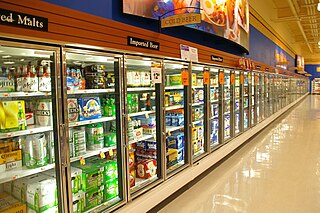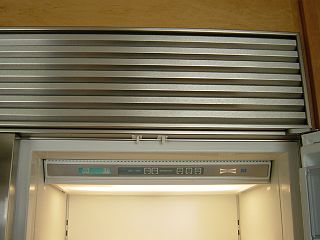Related Research Articles

The term refrigeration means cooling a space, substance or system to lower and/or maintain its temperature below the ambient one. In other words, refrigeration is artificial (human-made) cooling. Energy in the form of heat is removed from a low-temperature reservoir and transferred to a high-temperature reservoir. The work of energy transfer is traditionally driven by mechanical means, but can also be driven by heat, magnetism, electricity, laser, or other means. Refrigeration has many applications, including household refrigerators, industrial freezers, cryogenics, and air conditioning. Heat pumps may use the heat output of the refrigeration process, and also may be designed to be reversible, but are otherwise similar to air conditioning units.

Freezing food preserves it from the time it is prepared to the time it is eaten. Since early times, farmers, fishermen, and trappers have preserved grains and produce in unheated buildings during the winter season. Freezing food slows decomposition by turning residual moisture into ice, inhibiting the growth of most bacterial species. In the food commodity industry, there are two processes: mechanical and cryogenic. The freezing kinetics is important to preserve the food quality and texture. Quicker freezing generates smaller ice crystals and maintains cellular structure. Cryogenic freezing is the quickest freezing technology available due to the ultra low liquid nitrogen temperature −196 °C (−320 °F).

An ice cube is a small piece of ice, which is typically rectangular as viewed from above and trapezoidal as viewed from the side. Ice cubes are products of mechanical refrigeration and are usually produced to cool beverages. They may be produced at home in a freezer with an ice tray or in an automated ice-making accessory. They may also be produced industrially and sold commercially.

A refrigerator, colloquially fridge, is a commercial and home appliance consisting of a thermally insulated compartment and a heat pump that transfers heat from its inside to its external environment so that its inside is cooled to a temperature below the room temperature. Refrigeration is an essential food storage technique around the world. The lower temperature lowers the reproduction rate of bacteria, so the refrigerator reduces the rate of spoilage. A refrigerator maintains a temperature a few degrees above the freezing point of water. The optimal temperature range for perishable food storage is 3 to 5 °C. A similar device that maintains a temperature below the freezing point of water is called a freezer. The refrigerator replaced the icebox, which had been a common household appliance for almost a century and a half. The United States Food and Drug Administration recommends that the refrigerator be kept at or below 4 °C (40 °F) and that the freezer be regulated at −18 °C (0 °F).
Kelvinator was an American home appliance manufacturer and a line of domestic refrigerators that was the namesake of the company. Although as a company it is now defunct, the name still exists as a brand name owned by Electrolux AB. It takes its name from William Thomson, 1st Baron Kelvin, who developed the concept of absolute zero and for whom the Kelvin temperature scale is named. The name was thought appropriate for a company that manufactured ice-boxes and refrigerators.

Sub-Zero is an American brand of residential major kitchen appliances including refrigeration and wine preservation products built in the USA by the Sub-Zero Group, Inc. based in Madison, Wisconsin. The company also manufactures kitchen appliances under the Wolf brand name.
The Amana Corporation is an American brand of household appliances. It was founded in 1934 by George Foerstner as The Electrical Equipment Co. in Middle Amana, Iowa, to manufacture commercial walk-in coolers. The business was later owned by the Amana Society and became known as Amana Refrigeration, Inc. It is now owned by the Whirlpool Corporation.

Smeg is an Italian home appliance manufacturer.

An icebox is a compact non-mechanical refrigerator which was a common early-twentieth-century kitchen appliance before the development of safely powered refrigeration devices. Before the development of electric refrigerators, iceboxes were referred to by the public as "refrigerators". Only after the invention of the modern day electric refrigerator did early non-electric refrigerators become known as iceboxes. The terms ice box and refrigerator were used interchangeably in advertising as long ago as 1848.

An icemaker, ice generator, or ice machine may refer to either a consumer device for making ice, found inside a home freezer; a stand-alone appliance for making ice, or an industrial machine for making ice on a large scale. The term "ice machine" usually refers to the stand-alone appliance.

GE Appliances is an American home appliance manufacturer based in Louisville, Kentucky. It has been majority owned by multinational home appliances company Haier since 2016. It is one of the largest appliance companies in the United States and manufactures appliances under several brands, including GE, GE Profile, Café, Monogram, Haier and Hotpoint. The company also owns FirstBuild, a co-creation community and micro-factory on the University of Louisville's campus in Louisville, Kentucky. Another FirstBuild location is in South Korea, and a FirstBuild location in India opened its doors in 2019.

A kimchi refrigerator is a refrigerator designed specifically to meet the storage requirements of kimchi and facilitate different fermentation processes. The kimchi refrigerator aims to be colder, with more consistent temperature, more humidity, and less moving air than a conventional refrigerator, providing the ideal environment for fermentation of kimchi. Some models may include features such as a UV Sterilizer.
Vaccine refrigerators are designed to store vaccines and other medical products at a stable temperature to ensure they do not degrade. In developing countries with a sunny climate, solar-powered vaccine refrigerators are common.
LEC Refrigeration, known by its full title as Longford Engineering Company Refrigeration, is a British company manufacturing refrigerators and freezers.

A solar-powered refrigerator is a refrigerator which runs on energy directly provided by sun, and may include photovoltaic or solar thermal energy.
The Energy Conservation Program for Consumer Products Other Than Automobiles is a regulatory program that enforces minimum energy conservation standards for appliances and equipment in the United States. The program was established under Part B of Title III of the Energy Policy and Conservation Act of 1975 and gives the Department of Energy (DOE) the authority to develop and implement test procedures and minimum standards for more than 50 products covering residential, commercial and industrial, lighting, and plumbing applications. The Department of Energy is required to set standards that are "technologically feasible and economically justified."
Danby is the brand name of a line of appliances marketed by Danby Appliances Inc. and Danby Appliances Ltd., led by President and CEO, Jim Estill. Danby specializes in designing, manufacturing, and distributing small appliances through national and independent retailers in Canada, the USA, UK, and Mexico. It is a privately held Canadian and US company headquartered in Guelph, Ontario, and Findlay, Ohio. While the company is well-established in Canada, more than half of its sales are outside the country. The company has additional locations in Tolleson, Arizona, Saraland, Alabama and Foxboro, Massachusetts as well as a location in Guangzhou, China. It is affiliated with manufacturers in China, Mexico, Turkey, Thailand, India and the United States.

Summit Appliance is the residential product division of Felix Storch, Inc (FSI). It was founded and trademarked in 1969 and is now headquartered in the Bronx, New York City, where their manufacturing and operations are done. They have additional warehousing facilities in Edison, New Jersey. Summit is both an importer and manufacturer of appliances. Internationally, it sources products from manufacturers in Europe, South America, North America, and Asia. Many products are built or modified in its Bronx manufacturing facilities, for which it is recognized as a “Made In NYC” partner.
Many vaccines require refrigeration to remain active, and the lack of infrastructure to maintain the cool chain to reliably bring vaccines into more remote areas of developing countries poses a serious challenge to national immunization programs. Post millennium, a portable vaccine cooler unit has been proposed by several technologists. The WHO Performance, Quality and Safety (PQS) programme is a driver of the technology.

Vaccine storage relates to the proper vaccine storage and handling practices from their manufacture to the administration in people. The general standard is the 2–8 °C cold chain for vaccine storage and transportation. This is used for all current US Food and Drug Administration (FDA)-licensed human vaccines and in low and middle-income countries. Exceptions include some vaccines for smallpox, chickenpox, shingles and one of the measles, mumps, and rubella II vaccines, which are transported between −25 °C and −15 °C. Some vaccines, such as the COVID-19 vaccine, require a cooler temperature between −80 °C and −60 °C for storage.
References
- ↑ Undercounter Ice Markers in the 21st Century
- 1 2 "U-line : About Us". www.u-line.com. Archived from the original on 2006-06-12.
- ↑ "About U-Line".
- ↑ Romell, Rick (14 October 2014). "Ice-maker manufacturer U-Line sold to Illinois firm". Journal Sentinel. Retrieved 13 November 2018.